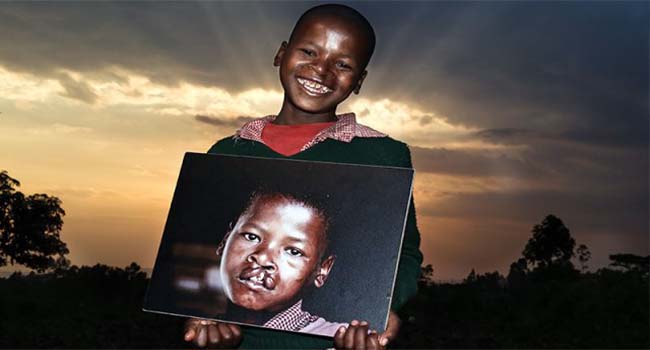KENYA, Nairobi, Oct 1 – Cleft lips and palates are some of the most common birth defects affecting children worldwide. The condition happens when parts of the developing face fail to fuse in the early months of pregnancy. A cleft lip greatly affects facial appearance and can be the source of a dented self-esteem, shame for children as they grow if not treated early.
No one knows the exact cause of a cleft lip and palate, but most experts agree that the condition arises due to a number of factors which may include genetic predisposition as well as environmental issues such as drug and alcohol use, smoking, maternal illness, infections, lack of Vitamin B, also known as folic acid.
The severity of the cleft lip and palate can vary from a notch on the upper lip or a depression in the palate to more severe forms which manifest as large gaps in one or both sides of the lip and gum. In some cases, the nose is also affected.
Treatment is designed to restore a normal look as well as improve affected functions such as the ability to suckle well which is important for babies and the ability to speak properly as they grow older. But it’s not always easy for children with cleft lips or palates to get the help they need, particularly in poorer countries.
This is because of limited surgical expertise, lack of funds for setting up specialised units and low awareness among the general public. The total number of cleft surgeons in Africa is not known but compared to other specialities, trained cleft surgeons are still relatively few.
Birth defects can be diagnosed during pregnancy by an ultrasound that provides pictures of the foetus’ facial features. In other cases, the defect is only noticed when the baby has been delivered. Approximately one in every 500 Kenyan babies is born with a cleft lip or cleft palate.
Since clefts are not life threatening, it is advisable to operate on affected children when they are big enough to withstand anaesthesia and the trauma of surgery. Doctors say that the optimal time for cleft lip surgery is when the child is three months old whereas 12 months is ideal for cleft palate repair.
The Pan African Association of Cleft lip and palate held its 6th Scientific Congress in Nairobi earlier this year. The two-day congress in March, focused on cleft repair and treatment and brought together over 130 medical experts from around Africa to discuss key developments in this field.
The Nairobi Hospital hosted a pre-conference surgery workshop sponsored by Smile Train where they offered free surgery and patients received free follow up treatment, orthodontic care and speech therapy to help with rehabilitation.
One of the issues that parents of children born with these birth defects face, is that most insurance companies including NHIF do not cover cleft lip and palate deformities as they are considered congenital, yet the surgery and treatment is not affordable to many. At the conference it was unanimously agreed that African governments must address this policy gap in order to support those affected.
It was noted that there was an urgent need to address the financial, infrastructural, and socioeconomic barriers for cleft care in Africa by improving funding for public health facilities, training more reconstructive surgery specialists and increases public awareness are good places to start.
Partnerships are key and this is where anybody can plug in – organisations such as Operation Smile and Smile Train among others are open to any support they can get. When governments, hospitals and non-governmental organisations work together, more children can get the treatment and care they need.
‘There’s nothing more satisfying than seeing a happy and smiling child. I always help in any way I can, even if it’s just by signing an autograph. A child’s smile is worth more than all the money in the world’ – Lionel Messi









































